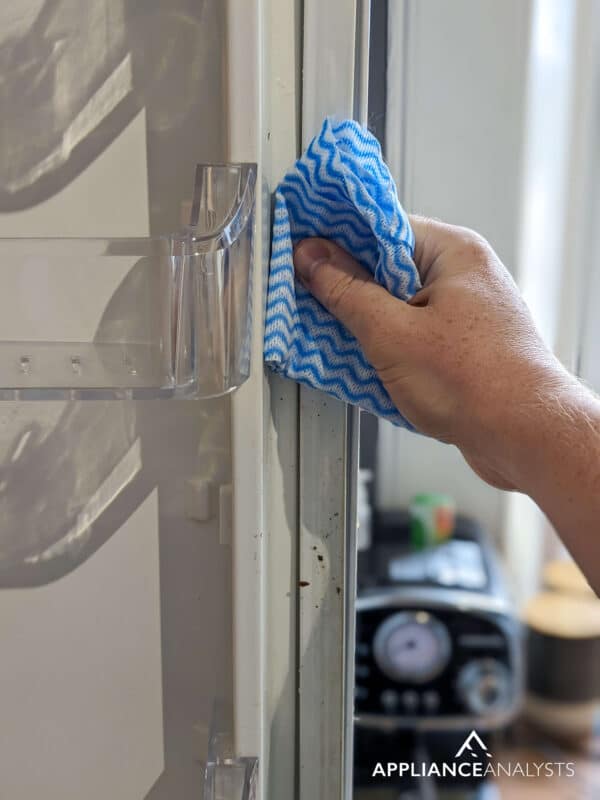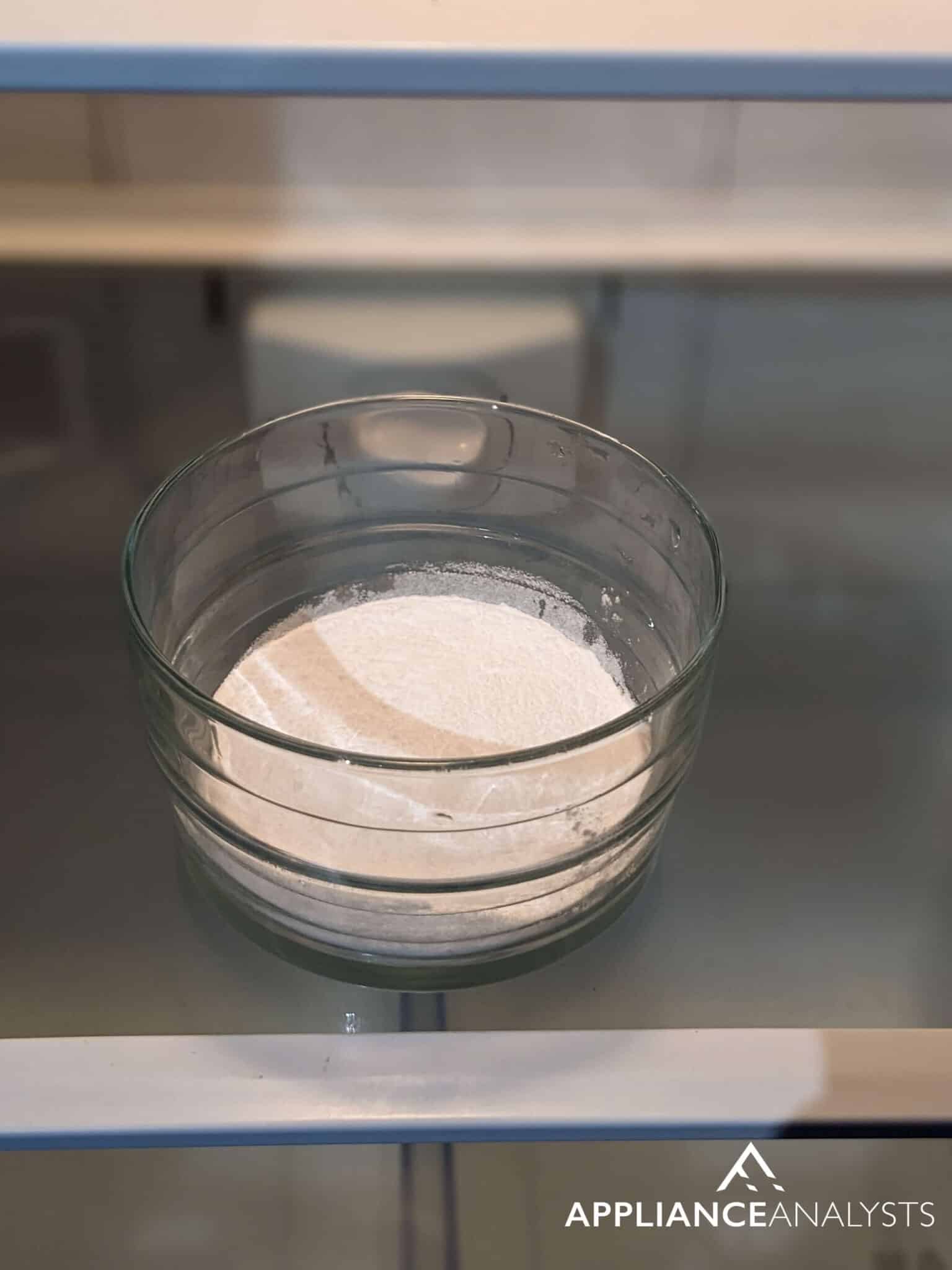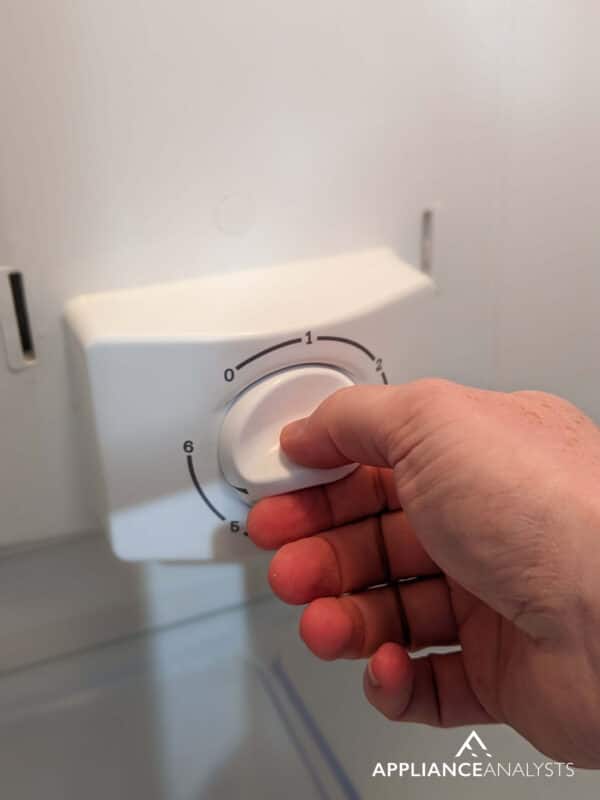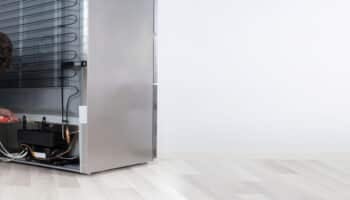We've independently reviewed this article to make sure it's as accurate as we can make it.
To find out more about our article creation and review process, check out our editorial guidelines.
Is there a foul smell coming from your fridge?
That sucks! Opening your refrigerator only to be greeted by an unpleasant smell can be quite annoying, especially when you’re unsure of where it’s coming from.
But don’t worry; I’m here to help.
If your fridge is smelling foul, you’ll need to remove any spoiled food and clean the unit thoroughly. But if the odor persists, please check the temperature, water filter, and internal components.
Read on to learn more about different ways to eliminate the bad smell!
Why trust us? This article was written by Craig Anderson and Andy Fulenchek.
Craig has helped thousands of other homeowners repair their appliances since 2016.
Andy is one of our resident appliance repair experts with over a decade of experience. He currently runs his appliance repair company with a team of trusted technicians.
Does Your Fridge Smell Bad? Try These 6 Simple Fixes
If you’ve noticed a foul smell coming from your fridge, don’t worry! In this section, I’ll guide you through the different reasons that can explain the odor and provide various solutions.
Are you ready? Let’s dive in!
#1 Remove Spoiled Food
When a fridge smells bad, I always check the food.
I know that checking for spoiled food can seem like a simple solution, but sometimes, the cause of a foul smell isn’t immediately obvious. Food can start to spoil without showing noticeable signs right away.
It’s important to inspect the contents of your fridge regularly. Even if you think everything is fresh, it’s easy to forget about containers hidden at the back or in the drawers.

Check for any texture changes in the food. If some items are slimy or excessively dry, they’re probably spoiled. Visible signs of mold, puffiness in packaging, and a foul smell also indicate that the food is no longer good.
In such cases, you must remove spoiled food from your fridge and place it in a separate plastic bag. Please ensure the bag is securely sealed before you dispose of it.
To make sure your food stays fresh in the fridge, try using labels. They’ll help you keep track of when you stored items and their expiry dates. It’s also important to arrange the products with earlier expiry dates at the front, so you can eat them first.
#2 Clean Your Fridge Thoroughly
Now, it’s time to clean your fridge. There are different cleaning methods and odor absorbers you can try to get rid of the foul smell.
But before delving into the instructions, please take a moment to prepare the cleaning solution. While commercial products can help eliminate the foul smell on your fridge, I find that using a natural alternative is safer and works best to prevent lingering chemical smells.
Mix equal parts of warm water and white vinegar in a spray bottle to clean your refrigerator. Just keep in mind that you should NEVER mix bleach and vinegar, as it can be harmful to your health.
Once you’ve prepared the cleaning solution, follow these instructions to clean your fridge:
- Unplug your fridge from its power source or turn it off at the circuit breaker.
- Remove all the food from the fridge. You can transfer it to a cooler to keep it fresh.
- Remove the shelves, drawers, and other removable compartments. Wash them with your natural cleaning solution on the sink and let them dry.
- Use the cleaning solution you’ve previously prepared and wipe down the interior walls and surfaces. Then, let them dry. Don’t forget to pay extra attention to any sticky residue.
- Clean the door seals and let them dry to prevent mold.
- Locate the drip pan and clean it with warm soapy water.
- Wipe down the exterior of your refrigerator and reassemble the unit. While you’re at it, you can vacuum the condenser coils to prevent temperature issues and a bad smell from outside your fridge.
- Plug your fridge back in or turn it on at the circuit breaker.

After thoroughly cleaning a fridge, I usually use an odor absorber to tackle any lingering smells.
You can crumple up some sheets of newspaper into balls, open a box of baking soda, or use a few charcoal briquettes. Place your chosen odor absorber in the fridge and let it sit there for a few days to neutralize any remaining odor effectively.

#3 Check the Temperature
If you’ve cleaned your fridge but still notice a foul smell, you’re probably dealing with a temperature issue.
Most refrigerators should sit between 3 °C (37.4 °F) and 5 °C (41 °F). Not setting your fridge to the right temperature can lead to food spoilage, condensation, mold, and bacterial growth.
So please check the thermostat dial and ensure you’ve selected the right temperature setting.

However, if your fridge is set to the correct temperature but is too warm, you’ll need to check for airflow issues. Read on to learn how to do it.
#4 Check for Airflow Issues
From what I’ve seen, airflow issues can lead to high temperatures and increased humidity in the fridge. As a result, your food can spoil and lead to a foul smell.
Ensuring proper airflow is one of the most effective ways to prevent unpleasant smells in your fridge. Here’s how to do it:
- Do not block your fridge’s vents with food containers.
- Don’t overload your fridge. It’s also important to avoid putting hot or warm food inside to prevent temperature issues.
- Check for frost buildup, as it can prevent air from flowing through the evaporator. If necessary, defrost the unit.
- Inspect the evaporator fan, as it’s responsible for circulating cold air throughout the unit. To do so, unplug your fridge and try to spin the fan blades manually. If they don’t spin freely or if there’s a grinding sound, you’ll need to replace it. You can also use a multimeter to check for electrical continuity.
If you want to get any replacement part – or see how much one would cost – click to enter your model number in the search bar below. Our partners at AppliancePartsPros stock almost every part with free guides on how to install them.

#5 Replace the Water Filter
If the water from your fridge tastes or smells bad, you must inspect the filter.
Over time, your refrigerator’s water filter can become clogged with minerals and other contaminants. If you don’t replace your water filter every six months, the particles can build up and lead to a foul smell in your fridge, affecting the taste of your water and ice.
To replace the water filter, turn off the water supply and remove the old filter. Then, clean the area around the filter housing and install the replacement. Finally, turn on the water supply and run about two gallons of water to flush out any contaminants.
Note: The process of installing a new water filter can vary depending on your fridge’s model number. Please read the manufacturer’s manual for detailed instructions.
#6 Inspect the Internal Components
If you’ve tried all the fixes above, but your fridge still smells foul, then there’s probably an electrical issue.
A faulty fan motor, defrost heater or control board can emit a bad, burning smell. In such cases, you must check for any loose connections or damaged wires.
If you’re dealing with an electrical issue, I recommend calling a professional, as damaged wiring can pose a risk of electrical shock. Professionals are trained to diagnose and fix the issue accurately.
Wrapping Up: Keeping Your Fridge Fresh and Odor-Free
Hopefully, now you know how to eliminate the bad smell from your fridge.
Remember that if your fridge is smelling foul, you’ll need to remove any spoiled food and clean the unit thoroughly with vinegar and warm water. Don’t forget to use an odor absorber, such as newspaper, baking soda, or charcoal briquettes, to eliminate any lingering smell.
It’s also important to ensure proper airflow, set the correct temperature, and check the internal components if the foul smell persists.
Thank you so much for taking the time to read this article. If you ever experience a different issue with your refrigerator, please check out our site.
Good luck!









